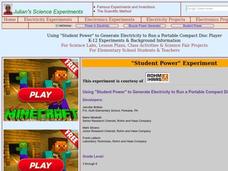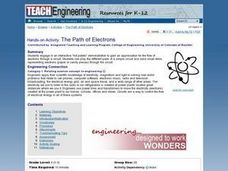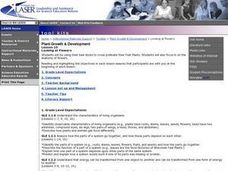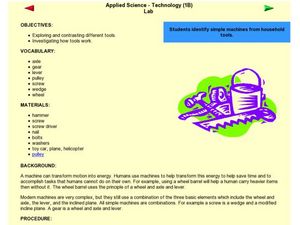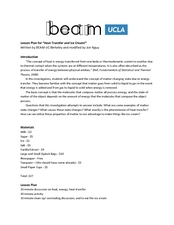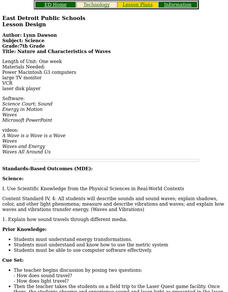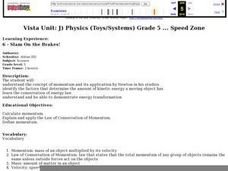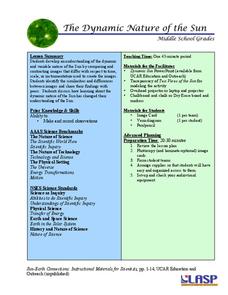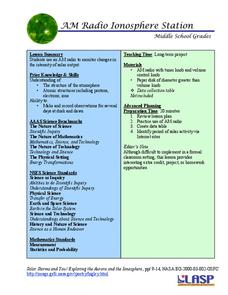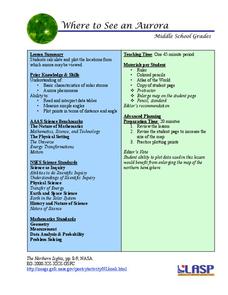Curated OER
Using "Student Power" to Generate Electricity to Run a Portable Compact Disc Player
Students explain the relationship between magnetism and electricity. For this physics lesson, students describe the transformation of energy. They create an electromagnet and investigate the factors affecting its strength.
Curated OER
Chemical Reactions
In this chemical reactions worksheet, students compare endothermic and exothermic reactions, closed and open systems, and reactants and products. Students review physical and chemical changes and how to balance equations. This worksheet...
Curated OER
The Path of Electrons
Students engage in an interactive "hot potato" demonstration to gain an appreciation for the flow of electrons through a circuit. They role play the different parts of a simple circuit and send small items representing electrons (paper...
Curated OER
Looking at Flowers
Students use their bee sticks to cross-pollinate their Fast Plants and also focus in on the anatomy of flowers. They analyze how the parts of a system go together, and how these parts depend on each other. Finally, students describe...
Curated OER
Household Tools
Students explore parts of a system. In this simple machines lesson, students discover that simple machines are composed of two or more systems. Students examine household tools and assess the parts of the system.
Curated OER
Understanding Power using Kirchhoff’s Rules
Twelfth graders cite real life applications of Kirchhoff's rules. In this physics lesson, 12th graders calculate current, power and voltage using Kirchhoff and Ohm's laws. They explain the different components and uses of transformers.
Curated OER
Connect the Species
Fourth graders, in pairs, explore energy transfer and species interrelationships by viewing slides on a microscope. hey explore phytoplankton (producers) and zooplankton (consumers)
Curated OER
"Heat Transfer and Ice Cream!"
Students analyze earth science by creating a frozen treat in class. In this heat transfer lesson, students discuss how matter is transformed from solid to liquid and liquid to gas when energy is removed from the equation. Students...
Curated OER
Nature and Characteristics of Waves
Seventh graders research different types of waves, identify the parts of a wave and create a Power Point presentation demonstrating what they have learned.
Curated OER
Working with Wavelets
In this working with wavelets learning exercise, students solve 7 various problems that include working with different wavelets in each. They compute the synthesis given two segments and y, describing what they observe. Then, students...
Curated OER
Biosphere
Students examine the basic biosphere and its components. In this ecology instructional activity students complete several experiments including designing a system that is balanced to sustain life.
Curated OER
Keep It Hot
Students design and conduct an experiment to explore the insulating abilities of different materials for keeping a liquid in a paper cup warm. A small group of lab partners test four different materials: black paper, white paper,...
Curated OER
Ammonium Nitrate - Heat of Solution
Students quantify the relationship between temperature, energy and heat
and define an endothermic reaction. They measure the energy change caused by dissolving one mole of ammonium nitrate in water.
Curated OER
Wind Energy
Students examine the methods of wind energy. They discover how a wind turbine generates electricity. They research the feasibility of installing wind turbines in their schools and construct a model wind turbine.
Curated OER
Using "Student Power" to Generate Electricity to Run a Portable Compact Disc Player
Students conclude that magnets and magnetic fields can produce electricity. Students also understand how a small motor works and how gears work. Students describe how energy can transform along a pathway.
University of Colorado
Can Photosynthesis Occur at Saturn?
In the 19th activity of 22, learners determine if distance from a light source affects photosynthesis. Participants capture oxygen in straws and find that the amount of water the gas displaces is proportional to the rate of photosynthesis.
Curated OER
Slam On the Brakes!
Fifth graders study the concept of momentum and its application by Newton in his studies. They view a demonstration and complete an experiment with toy cars on a racetrack that shows them the properties of momentum and how velocity and...
University of Colorado
Using Spectral Data to Explore Saturn and Titan
Saturn's rings are made of dust, ice, and solid chunks of material. Individuals use spectrographs in this final installment of 22 lessons to determine the atmospheric elements. They analyze spectrums from Titan's atmosphere and Saturn's...
University of Colorado
The Jovian Basketball Hoop
A radio receives radio signals, converts them to an electrical signal, then converts this signal to a sound signal, and amplifies the sound so people can hear it. Class members use this information to create a short-wave radio antenna...
University of Colorado
The Jovian Basketball Hoop
Can you listen to Jupiter on a simple radio? Turns out the answer is yes! The resource instructs scholars to build a simple radio to pick up the radio waves created when the charged particles from the sun hit Jupiter's magnetic...
PHET
The Dynamic Nature of the Sun
In this second lesson of the series, pupils learn to observe similarities and differences in photos of the sun and record them in a Venn diagram. Then, small groups practice the same skill on unique images before presenting their...
PHET
Radiation Hazards in Space
Young scientists race from Earth to Mars and back, trying to complete mission objectives while avoiding radiation in this game for 2-4 players. To identify the winner, players must graph their mission points and radiation points at the...
PHET
AM Radio Ionosphere Station
Tune in! Young scientists use an AM radio at home to monitor solar output. The long-term project would be ideal in a flipped classroom or as an out-of-class project.
PHET
Where to See an Aurora
Where can you see an aurora in North America? After completing an astronomy activity, scholars can locate the exact coordinates. Pupils plot points of the inner and outer ring of the auroral oval and answer questions based on their...


